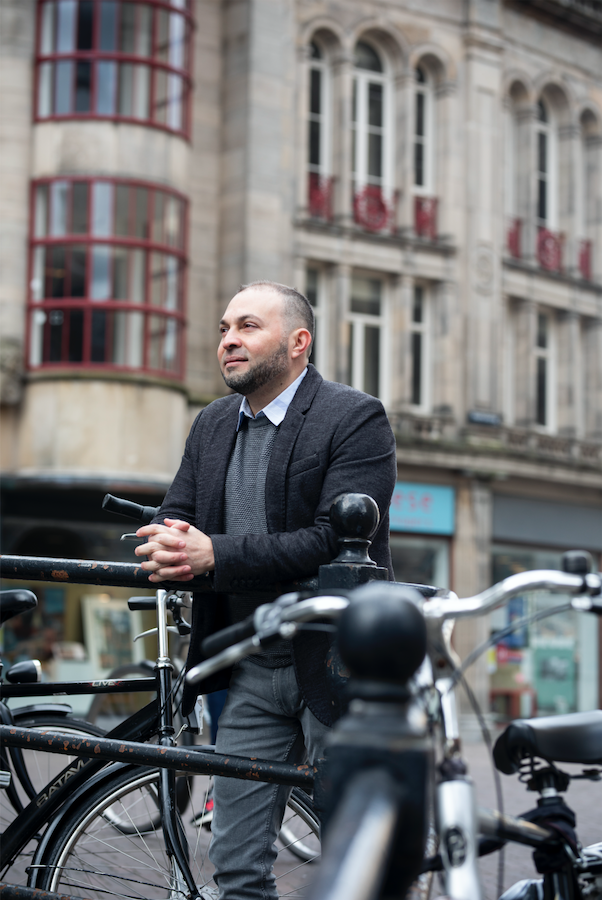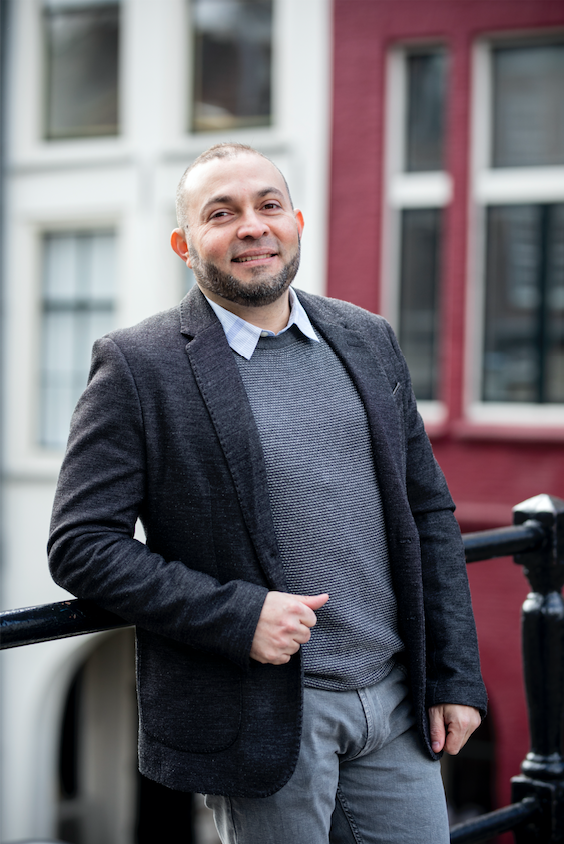A Venezuelan defender of Human Rights
Written by: Inti Suarez
David is a professor, a professor from one of the most important universities in his country. There are many images that we associate to such title. We think in intellectuals, in complicated matters that require nights of study, in long lessons delivered to big audiences, in a small office, crowded with disordered books and journals. I can imagine that all these images, and more, do apply to David, even when we didn’t speak about anything of that. Another thing that we expect from professors is that they are detached from the world. What I can tell you is that David is nothing but. Because we did talk about that. As it happen David is a professor of law in Venezuela. And he is deeply involved with the defense of human rights in his country, and in Latin America.
So one has to ask himself what makes a professor, a professor of international law and human rights for what matters, to take the task that traditionally activists take, when facing a dictator, a tyranny. The answer from David is, actually, disarming. He tells about his students, he tells you about the persons that came to him, to learn the law of his country. And he would tell you how they went to protest when their government disowned the elected parliament, won by the opposition. And how they were repressed, detained and eventually tortured in prison. I said that David is a professor, he teaches international law and human rights. So he explained me, as if I would be another student, that back in 2014 it was important to document what was happening. The international definition of torture is precise, he explains me. State torture is not one functionary here of there mistreating, in any way, a detained person. For torture to be recognized in an international court of law there has to be an underlying intention, a coherent plan to use violence to suppress political manifestation. So David started what came to be known as Aula Abierta (open classroom), an organization to simply document what was happening to his students. Just like any other investigation project that any other professor in any other country or university would do, one could say. With the difference, that is, that he was, and is, studying the use of violence by an authoritarian state that represses, and eventually kills, his own students.

“Back in 2014 we didn’t know” he tells me. “So we begun to write down what was happening to our students, how were they detained and where and why, and what happened to them meanwhile in detention”. Doing this, David and his team begun to discover patterns. They begun to see that what the police officers, and the soldiers, did to his students was actually the same. It wasn’t only in his city, Maracaibo. The same patterns were found, again an again, when they begun to document the repression across the country. So they look, and they saw the beast straight in the eye. So they could see that it wasn’t a group of soldiers untrained to manage civil protests, or few brutal police officers, but a well established code to humiliate, terrorize and break people that dare to disagree with the regime. So yes, the Bolivarian revolution was torturing her citizens.
As the name says it, a university is meant to be an institution beyond the borders of a country. So David has colleagues not only in Venezuela, but in other universities in the region. And Latin America, in our years, is not a pacific continent. So it happened that when student protests break in Nicaragua in 2018, David enlarged the reach of his research and went on documenting the use of violence by just another authoritarian regime. And then again, to their surprise, they found patterns. They realized that the repressors of students in Nicaragua shouted the same insults to the Nicaraguan students that the repressors of Venezuela shouted two years before. They documented, again and again, that the threats were the same, that the many humiliations were repeated, just like if it all would have been orchestrated and coordinated.
Up to here I had been hearing what David had to tell me, not interrupting him, but making the minimal questions needed to understand what he was telling me. But I needed air, perhaps, so I interrupted him to think, to have a break. Yet the only thing that I could remember was the plan Condor of the seventies, when the right wing dictatorships of South America not only exchanged the repression knowledge that they gained in France and in the USA, but they also exchanged torturers and prisoners. I asked David if we were seeing the opposite, but the same. Could we speak of a Condor plan of the left wing dictators of the XXI century, as much as the right wing dictators of the XX century did? Here, perhaps, I obtained one of the most chilling answers from David. He explained me then, and repeated many times in the time that we had left, that the repression that we are seeing in Latin America in the last decade is not ideological, not at all. Because as much as his research did not stop in Venezuela, it neither stopped in Nicaragua. David told me about the patterns that they are documenting in the Brasil of Bolsonaro, or the long well known practices of the Colombian government. So David explained, with the patience that a professor has with a student that is not too bright and not too fast, that the use of violence in South America is not partisan, nor ideological. That as much as the regime or Maduro in Venezuela, the government of Ortega, or the militias of Bolsonaro, repression is the instrument of power in South America today. David repeated to me, and then to you that read, that if his research has one thing to offer, is that ideology is, today, not the problem. The problem is the indiscriminate use of violence, at the left, and at the right, from these new authoritarianisms that have grown from the failure of the liberal democracies in the years eighties and the nineties, the democracies that did not manage to address the structural inequalities and frustrations of their citizens.

So. To here the most impressive message that I could glean from talking a couple of hours with David, an afternoon in Den Haag, he being on his way to another meeting of another international institution that documents repression and torture in our planet. You can imagine that when I was asked to interview a Venezuelan human right defender I reached to my venezuelan friends, and I asked about him. Even though only few of us haven’t migrated yet, my few contacts could tell that indeed David was legit and committed, having for long time argued on seeing academic freedom as a human right deeply threatened in Venezuela. So I asked him about that too. Being Venezuela in the middle of a fierce repression that threatens the mere fabric of democracy, why to work on academic freedom? There should be other rights that are… more fundamental? more urgent?
Once again, the answer from David was disarming. Without pomposity or grand rhetoric, David told me a tale that I had almost forgotten, after having lived for more than twenty years in the Netherlands, and not having been in a classroom for longer. The university, he said, is the lung of democracy. It is in the university that people gathers to imagine and generate and create new futures, it is in the university where peoples of different extractions and ethnicities come together and are capable of create a better future for themselves, and for the country that they live in. So today, David told me, the universities of South America are facing the same three-elements squeeze, again in different countries with different ideologies in power. In first place, all our governments are criminalizing protests coming from society in general and from the university in specific. Then they are decreasing the budgets available for universities (consider that a university full professor is apt to earn today 5 dollars a month in Caracas, where the cost of life is comparable with Utrecht’s). Last but not least there is an increasing discrimination of the academic product that disagree with the ideology of the government in place. Oppressed from these three directions, David told me, the universities are doomed to extinction, and with them, the building of another government, of another society, when our current tyrannies collapse and disappear.
And so I understood, and I expect you too, why the work of this professor of law, in remote Venezuela, is important. So I thanked him, and went back to Utrecht. And I wrote this.
David Goméz Gamboa
General Director Aula Abierta Latinoamérica
@aulaabiertave @liberacademica
www.aulaabiertavenezuela.org
www.derechosuniversitarios.org
www.libertadacademica.org

